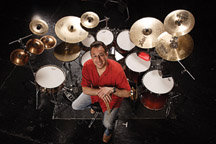The Hudson Riverfront Performing Arts Center (HRPAC) summer concert series this year begins big – with a 20-piece Afro-Cuban ensemble headed by a legendary percussionist and Grammy nominee.
The annual series brings free concerts every two weeks to the Weehawken waterfront. The mission of HRPAC, a non-profit organization that presents such concerts year round, is to further the arts in Hudson County. The group has pushed for several years to build a new county arts center on the waterfront as well, although this endeavor is not close to fruition.
The group will host a performance every other Wednesday at 7 p.m. in the Lincoln Harbor section of Weehawken, where prominent businesses including UBS, the Sheraton, and several restaurants are located. The concerts run from June 30 through Aug. 25.
“You’ll be in for a treat.” – Bobby Sanabria
________
The concerts are free and open to the public. See sidebar for a list.
Latin jazz
The June 30 performance features The Bobby Sanabria Big Band, an Afro-Cuban ensemble featuring five saxophonists, four trumpeters, four trombones, a pianist, hand percussionists, and more, playing musical styles like the Mambo and the Cha-cha-cha.
“The music is strongly Afro-Cuban with a lot of jazz arranging,” Sanabria said. “It’s adventurous and accessible.”
In fact, the band plays a wide range of songs, from jazz standards to covers of songs from the exploratory rock composer Frank Zappa.
“You’ll be in for a treat,” he said.
The son of Puerto Rican immigrants and a Bronx, N.Y.-native, Sanabria has worked with a veritable Who’s-Who in the jazz world, like legendary jazz trumpet player Dizzy Gillepsie and nine-time Grammy Award winner and former Weehawken resident Paquito D’Rivera.
“Besides being a great musician and bandleader, Bobby Sanabria is an educator and expert on the Latin music scene,” said executive director of HRPAC Bruce Sherman.
For Sanabria, who also arranges the music for the band, being a bandleader isn’t much different from being a competent percussionist.
Quoting the American swing-jazz drummer Panama Francis, Sanabria said: “The drummer drives. Everybody else just rides.”
A cultural exchange
According to the accomplished composer and educator, Afro-Cuban music was part of American mainstream culture in the 1950s when Cuba was a playground for the wealthy elite.
“After World War II, all the hotels were being developed in Havana,” Sanabria said. “If you had the money, that was the place to be.”
But with the rise of communism and a deteriorating political relationship between America and Cuba, the music fell out of favor.
“Everybody had to learn how to Cha-cha-cha,” he said. “But then, Cuba was cut off. No one could travel to the country; Cubans couldn’t come here. Bands stopped recording it, and the music went underground.”
Small safe havens were formed for Afro-Cuban music, mostly in Puerto Rican communities in New York City, Sanabria said.
“There weren’t many radio stations in Puerto Rico in the ’30s and ’40s,” he said. “If you turned on the radio, you heard music coming from these huge radio stations in Cuba, which could be heard anywhere from Central and South America to Texas.”
The Puerto Rican community “adopted and adapted” the style, eventually transforming it into the style that Sanabria and his band play today.
For a more in-depth look at Latin music, visit www.pbs.org/wgbh/latinmusicusa to view a documentary in which Sanabria was featured.
‘Truth, freedom and revolution’
“Jazz is a style that best represents the U.S.,” Sanabria said, “because it stands for truth, freedom and revolution.”
The truth in jazz music is the virtuosity. “You go to a rock show and it’s all smoke and mirrors,” he said. “Jazz music is judged on the skill, or lack there of, of a soloist. If you get up there, you better be able to play.”
The democratic way in which each musician takes a turn playing lead while the others back him up, and the individual expression of the soloists, is the freedom. And the revolution stands for “pushing the music” or creating new and innovative styles.
“We’re using folkloric elements and [music from] deep Afro-Cuban religious traditions,” he said. “Odd meters, stopping on a dime and making changes. My motto on the bench is that everything is subject to change.”
For more information on Bobby Sanabria, visit www.bobbysanabria.com.
For more information on the concerts, check the HRPAC website www.hrpac.org or call (201) 716-4540.
Sean Allocca can be reached at editorial@hudsonreporter.com
Schedule of HRPAC free summer concerts
June 30 – The Bobby Sanabria Big Band
July 14 – The Sensational Soul Cruisers
July 28 – The Alternate Routes
Aug. 11 – RumbaTap
Aug. 25 – Danielia Cotton
